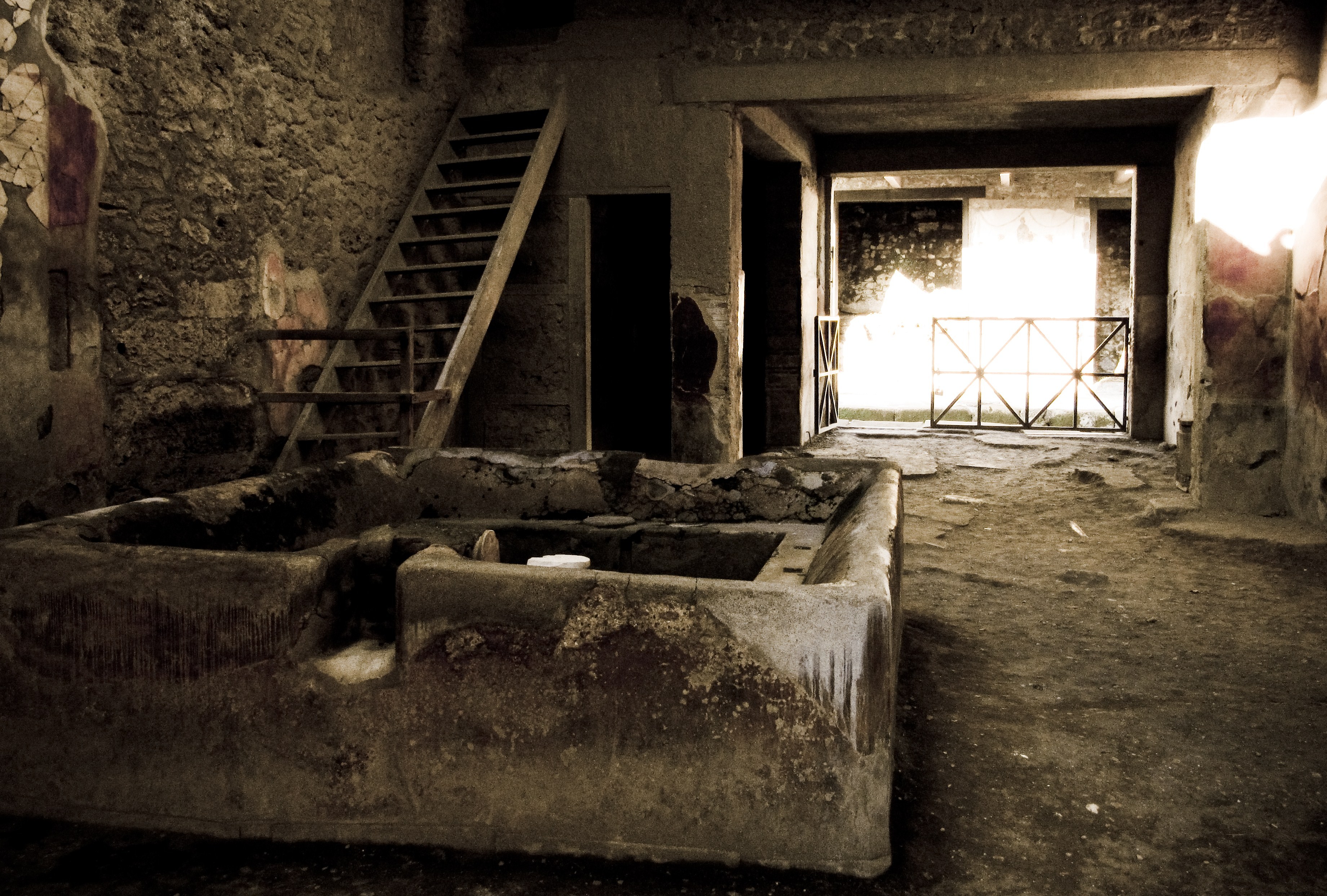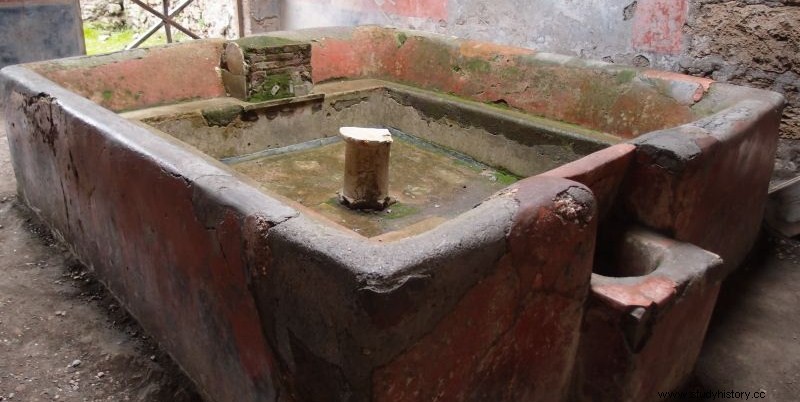[…] The little fullonica of Quinto Talpicio was located behind the wall of the necropolis. Iónica, Aula Plautia's most trusted slave—one of the most admired and envied matrons in the entire colony—had come that morning to pick up her master's robes and robes. Talpicio had a very bad reputation throughout the colony. He was expensive and his methods very controversial. Everyone knew that a group of old, malnourished and emaciated slaves were crowded into his small washing basin, taking longer than usual to rinse the clothes. But the worst was not that; the urine that he used in the process came to him in any way, collected in latrines and brothels, in addition to using cheap and diluted essences to remove that acid aroma from the garments after pressing them. But there wasn't much else to choose from. Of the five establishments that existed in the colony before the Frankish assault, only two remained in operation:Voconio's and his.
Ionic was not alone. Other house slaves like her endured that unpleasant wait in the hall of the fullonica, waiting patiently for her orders to be delivered. Despite being Ianuarius, the stench emanating from the rinse room was unbearable. She consoled herself by thinking of the poor people condemned to spend their days soaking togas in a puddle of urine; in summer that task would be even worse. She had to go outside for a cold breath of morning air to prevent a retching from taking over and causing her to throw up her breakfast porridge. It was a bleak, leaden day. There were still small sheets of ice between the darker slabs of the street that refused to melt and slide between the cracks of the road towards the canopy.
Ionica, do you know that the praeses is already here? —Asked one of her roommates when she entered the fullonica again.
—I already found out; My wife told me yesterday. Severina, these are bad times for our faith.
—Yes, we'll have to be very careful while the praeses is in town. What you hear at meetings about him is creepy. Many brothers are very pessimistic about it.
—Nor should we be intimidated. God has arranged it this way, and this is how we have to accept it. Every day I pray for those two poor men.
—Have you seen them? —the slave whispered in her ear, thereby avoiding any interested and revealing ears.
—No, but I know that my lord Antonio visits the younger of the two and… Do you know something, Severina? Since going to see him, I notice him a little more changed, more tolerant.
—Your Mr. Antonio has always been a prudent man.
—Yes, but now his gaze does not show resentment and hatred, I would even say What apathy, as he showed years ago. It seems that, finally, the wounds of the past are beginning to heal.
—Ionica, I don't see your good face, has something happened to you with your wife?
—No, it's just that I haven't slept well; Yesterday I had very strange dreams. There was a crow cawing in the middle of a landfill, and all of a sudden she took flight to where I was, and turning around, I woke up. When I went back to sleep I saw a millstone on a pebbly beach; I ran towards her and, when I was about to reach her, I fell on the gravel. When I looked up I saw the sea, but not ours, but a coast that is also familiar to me, with a mountain and an islet covered in mist...
—Yes, it is strange... Is it a message from the Lord?
At that precise moment a young and famished slave appeared with a basket full of cloths, tunics, togas and other service fabrics. He stared at the clientele and in a powerful voice he said:
—Ionic! Here it is; don't be distracted, you've already seen how people are today… […]

Stephanus' Fullonica
Collaboration of Gabriel Castelló
Serve this simple passage taken from my novel Devotio to introduce the business that we are going to address today. Every Roman city or colony had one or more fullonica , our current laundry and dry cleaning . Remains of these businesses have been found in Ostia, Barcino and Herculaneum, some of them like that of Stephanus in Pompeii in an excellent state of preservation. It consisted of a household linen and clothing washing shop, nothing relevant except for the way in which said cleaning was carried out before the use of artificial chemical substances. Human urine was the main raw material used in the rinsing pool (saltus fullonici ), since the ammonia it contains, combined with lime and ashes as whiteners, was able to remove stains from tunics, togas and woolen tablecloths. Its obtaining was curious, from imported in amphorae from remote places (the Hispanic was considered to be of the best quality) or collected in public latrines and even, as in the current urinals of a shopping center, directly from the walls of the fullonica where there were Half amphorae perforated at their base were arranged so that passers-by could relieve their bladders by walking through the portico. In Pompeii you can read signs on the walls that invite you to do so. This urine was mixed in the amphorae with the ashes and lime and was later poured into the rafts where the slaves would be in charge of rinsing the fabrics as if it were a winepress, stepping on the garments and impregnating them with the pestilential but detergent emulsion of soda. and urine.
The process was very simple:after a brief inspection of the garments and the pertinent patches and repairs were made, they were thrown onto the raft for the intense trampling of the slaves. Once the stains had disappeared, the garments were taken to a larger outdoor pool, called lacuna fullonica , where they were rinsed with rainwater collected in the impluvio , they were drained and then hung out in the sun, perfumed with herbal and floral essences once dry for a few more coins for the more affluent customers. In the eagerness of the public administration to collect for everything, something that sounds very familiar today, the Emperor Vespasian decreed a tax on the urine collected in the fullonicae themselves. through free donations from citizens. Suetonius says that Titus, the emperor's son, reproached his father for said tax and that he took an aureus out of his bag, put it in his hand and asked if his smell bothered him. Tito denied it, and his father replied:“ and yet, it comes from urine ”. PECVNIA NON OLET… Money doesn't smell .

saltus fullonici
